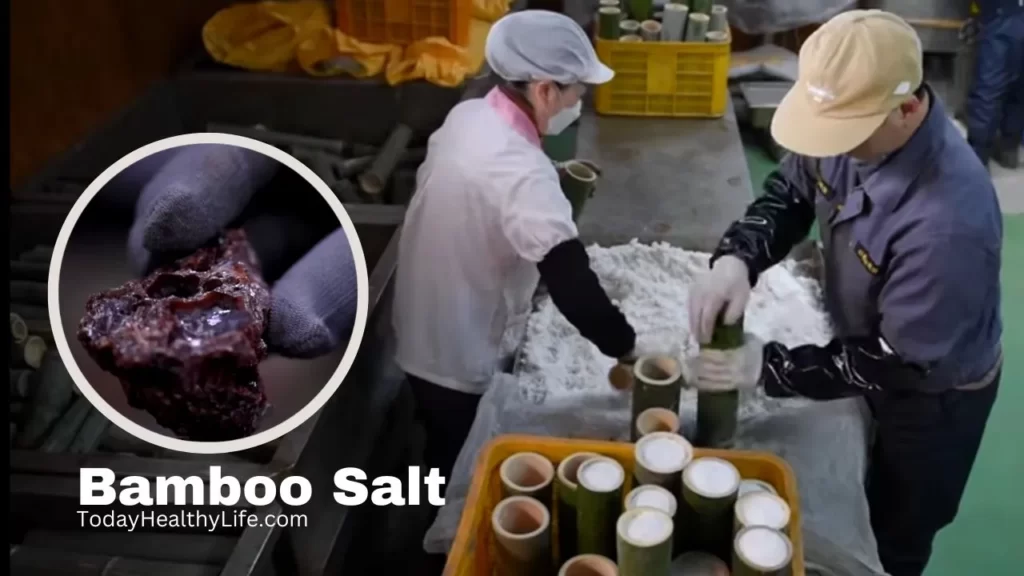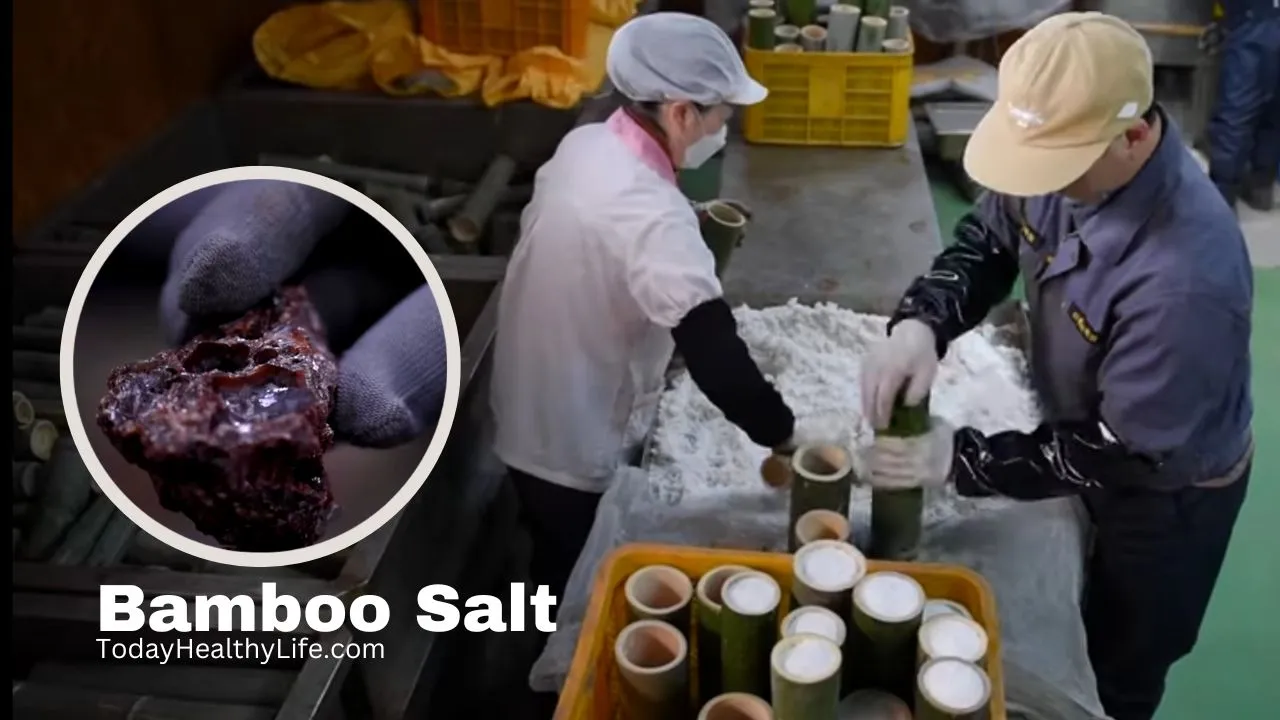Bamboo salt is a type of salt that is made from the bamboo plant, but the question of many people what is bamboo salt used for.
This unique salt has a variety of uses, including in food, medicine, and skincare products.
This salt is thought to have health benefits due to its high levels of minerals.
Let’s take a closer look at what bamboo salt is used for and some of the benefits it offers.

Table of Contents
What is Bamboo Salt?
Bamboo salt is made by filling hollowed-out bamboo stalks with sea salt and burning them in a clay pot.
This process is repeated up to nine times, causing the salt to become enriched with minerals from the bamboo and clay pots.
This salt has a rich, earthy flavor and a dark gray color.
Bamboo salt is mainly produced in Korea and can be found in Asian markets or online.
Also Read: Bamboo Salt: Price, Nutrition, Benefits, Side Effects & All.
What is Bamboo Salt Used For?
Bamboo salt is mainly used for culinary purposes, as a flavor enhancer in dishes such as soups and stews.
It can also be used as an alternative to regular table salt for seasoning foods or adding a unique flavor to dishes.
Traditional Korean medicine uses bamboo salt for its potential health benefits. It is believed to have detoxifying properties and is commonly taken as a tonic or added to hot water for a cleansing drink.
Bamboo salt is also used topically in skincare products, as it is thought to have anti-aging and skin-nourishing effects.
Here is one by one breakdown of the uses:
- Culinary purposes: Bamboo salt is used as a seasoning in various Korean dishes to enhance their flavor. It can be added during cooking or sprinkled on top of prepared dishes as a finishing touch. It is commonly used in soups, stews, stir-fries, marinades, sauces, and other savory recipes.
- Health tonics: In traditional Korean medicine, bamboo salt is often used as a health tonic. It is believed to have detoxifying and balancing properties. Some traditional practitioners may recommend bamboo salt for specific health concerns or as a general supplement to promote overall well-being.
- Beverages: Bamboo salt can be dissolved in hot water to make a salted tea, which is consumed for its potential health benefits and unique flavor. It can also be added to other beverages, such as fruit juices or herbal teas, to impart its distinct taste.
- Natural oral care: Bamboo salt is sometimes used in natural toothpaste formulations due to its potential antimicrobial properties. It is believed to help maintain oral health and freshen breath. However, it’s important to note that dental care should be approached under the guidance of a dental professional.
- Skincare products: Some skincare products, such as scrubs or masks, may incorporate bamboo salt for its exfoliating and potential antioxidant properties. It is believed to help remove dead skin cells and promote smoother skin texture. However, it’s advisable to follow the instructions provided by the manufacturer or consult a skincare professional.
It’s worth noting that bamboo salt has a distinct and potent flavor compared to regular salt.
Therefore, it’s recommended to use it sparingly and adjust the quantity according to personal taste preferences.
Possible Health Benefits
Bamboo salt is said to have high levels of minerals due to the repeated burning process it undergoes during production.
These minerals may provide health benefits, such as improved digestion and immune system function.
However, more research is needed to fully understand the potential health benefits of bamboo salt.
Overall, bamboo salt offers a unique flavor and may offer various health benefits.
It can be used in cooking, traditional medicine, and skincare products. Give this special type of salt a try and explore its potential benefits for yourself.
Nutritional Value
Bamboo salt is a rich source of minerals, including calcium, magnesium, and iron. It also contains trace amounts of zinc and copper.
However, the exact nutritional value of bamboo salt varies depending on how many times it has been burned during production.
Generally, the more times it has been burned, the higher its mineral content will be. Keep in mind that bamboo salt should be used in moderation, as it is still high in sodium like regular salt.
100 g of bamboo salt contains:
| Nutrient | Amount |
|---|---|
| Calories | 0 |
| Total Fat | 0 g |
| Saturated Fat | 0 g |
| Polyunsaturated Fat | 0 g |
| Monounsaturated Fat | 0 g |
| Cholesterol | 0 mg |
| Sodium | 190 mg |
| Potassium | 43 mg |
| Total Carbohydrates | 0 g |
| Dietary Fiber | 0 g |
| Sugars | 0 g |
| Protein | 0 g |
| Calcium | 370 mg |
| Iron | 1 mg |
| Magnesium | 32 mg |
| Manganese | 0.2 mg |
| Phosphorus | 200 mg |
| Potassium | 43 mg |
| Zinc | 0.4 mg |
To sum up, bamboo salt can offer a unique taste and potentially provide health benefits due to its high mineral content.
However, more research is needed to fully understand the effects of bamboo salt on health. As with all types of salt, it should be consumed in moderation.
Give bamboo salt a try and see if it adds a special touch to your cooking and skincare routine.
Are There Any Side Effects or Precautions?
There is currently not enough research to determine the potential side effects of bamboo salt.
As with all types of salt, it should be consumed in moderation as high sodium intake can lead to adverse health effects such as high blood pressure and heart disease.
It is also important to note that if you have any specific health conditions or are taking medication, it is best to consult with a healthcare professional before incorporating bamboo salt into your routine.
If using topically for skincare, do a patch test on a small area of the skin first to check for any potential irritation or allergic reaction.
Where to Buy Bamboo Salt?
Bamboo salt can often be found in Asian markets or online.
It is important to check the labeling and ingredients to make sure you are purchasing genuine bamboo salt and not regular salt mixed with bamboo extracts.
Look for brands that use traditional methods of production and offer pure, high-quality bamboo salt.
If unsure, consult with a healthcare professional or expert in traditional medicine before purchasing.
When you visit Korea, you can always visit Jiri Mountain where the bamboo salt originates, and buy it from its source.
Also, most traditional markets will have bamboo salt for sale or you can find it in Korean grocery stores.
Some Related FAQs:
Yes, bamboo salt does not contain ingredients derived from wheat, barley, or rye, so it can be considered gluten-free.
However, there is a possibility of cross-contamination during production if the facility also processes products containing gluten.
If you have a severe allergy or intolerance to gluten, it is best to confirm with the manufacturer or choose a product that is specifically labeled as gluten-free.
Bamboo salt can be used as a substitute for regular salt in cooking and skincare products. It offers a unique flavor and may provide health benefits due to its high mineral content.
However, keep in mind that it still contains high levels of sodium and should be consumed in moderation.
Bamboo salt does not contain any animal products or byproducts, so it can be considered vegan-friendly.
However, as with gluten-free products, there is a possibility of cross-contamination during production if the facility also processes non-vegan products.
If you follow a strict vegan diet, it is best to confirm with the manufacturer or choose a product that is specifically labeled as vegan.
Conclusion
So, what is bamboo salt used for? Bamboo salt can be used in cooking to add a unique flavor, as well as in skin care products for its potential health benefits.
It is important to note that bamboo salt still contains high levels of sodium and should be consumed in moderation.
Before incorporating this salt into your routine, consult with a healthcare professional or expert in traditional medicine to ensure it is right for you.
Bamboo salt can often be found in Asian markets or online, but make sure to check the labeling and ingredients for purity and quality.

